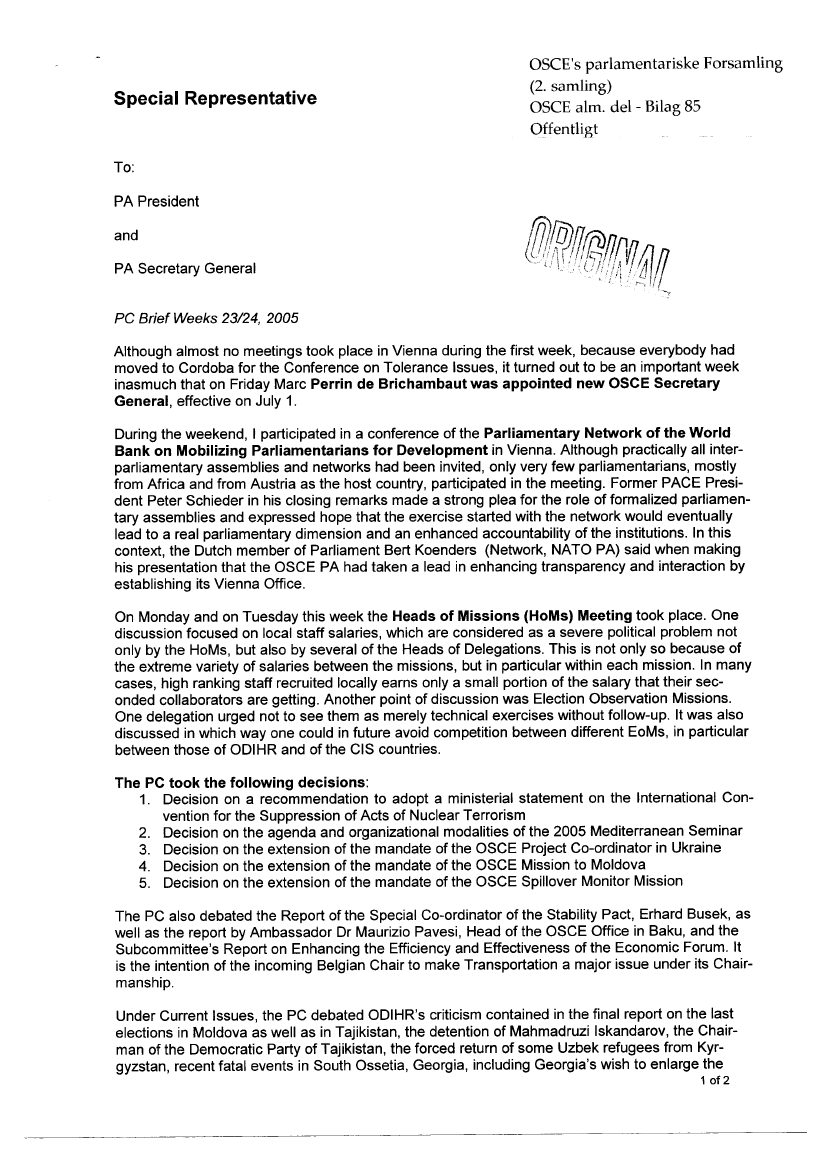
Special Representative
OSCE's parlamentariske Forsamling
(2. samling)
OSCE alm. del - Bilag 85
Offentligt
To:
PA President
and
PA Secretary General
PC Brief Weeks 23/24, 2005
Although almost no meetings took place in Vienna during the first week, because everybody had
moved to Cordoba for the Conference on Tolerance Issues, it turned out to be an important week
inasmuch that on Friday Marc Perrin de Brichambaut was appointed new OSCE Secretary
General, effective on July 1.
During the weekend, I participated in a conference of the Parliamentary Network of the World
Bank on Mobilizing Parliamentarians for Development in Vienna. Although practically all inter-
parliamentary assemblies and networks had been invited, only very few parliamentarians, mostly
from Africa and from Austria as the host country, participated in the meeting. Former PACE Presi-
dent Peter Schieder in his closing remarks made a strong plea for the role of formalized parliamen-
tary assemblies and expressed hope that the exercise started with the network would eventually
lead to a real parliamentary dimension and an enhanced accountability of the institutions. In this
context, the Dutch member of Parliament Bert Koenders (Network, NATO PA) said when making
his presentation that the OSCE PA had taken a lead in enhancing transparency and interaction by
establishing its Vienna Office.
On Monday and on Tuesday this week the Heads of Missions (HoMs) Meeting took place. One
discussion focused on local staff salaries, which are considered as a severe political problem not
only by the HoMs, but also by several of the Heads of Delegations. This is not only so because of
the extreme variety of salaries between the missions, but in particular within each mission. In many
cases, high ranking staff recruited locally earns only a small portion of the salary that their sec-
onded collaborators are getting. Another point of discussion was Election Observation Missions.
One delegation urged not to see them as merely technical exercises without follow-up. It was also
discussed in which way one could in future avoid competition between different EoMs, in particular
between those of ODIHR and of the CIS countries.
The PC took the following decisions:
1. Decision on a recommendation to adopt a ministerial statement on the International Con-
vention for the Suppression of Acts of Nuclear Terrorism
2. Decision on the agenda and organizational modalities of the 2005 Mediterranean Seminar
3. Decision on the extension of the mandate of the OSCE Project Co-ordinator in Ukraine
4. Decision on the extension of the mandate of the OSCE Mission to Moldova
5. Decision on the extension of the mandate of the OSCE Spillover Monitor Mission
The PC also debated the Report of the Special Co-ordinator of the Stability Pact, Erhard Busek, as
well as the report by Ambassador Dr Maurizio Pavesi, Head of the OSCE Office in Baku, and the
Subcommittee's Report on Enhancing the Efficiency and Effectiveness of the Economic Forum. It
is the intention of the incoming Belgian Chair to make Transportation a major issue under its Chair-
manship.
Under Current Issues, the PC debated ODIHR's criticism contained in the final report on the last
elections in Moldova as well as in Tajikistan, the detention of Mahmadruzi Iskandarov, the Chair-
man of the Democratic Party of Tajikistan, the forced return of some Uzbek refugees from Kyr-
gyzstan, recent fatal events in South Ossetia, Georgia, including Georgia's wish to enlarge the
1 of 2